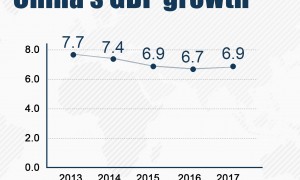The replacement of business tax by value added tax has been hailed as a concrete step in deepening reform of China’s taxation sector. Just what will it mean for Chinese businesses, especially under recent economic headwinds.
This is a new fitness club in the heart of Shanghai. As people become more concerned about their bodies and health, the club is planning to expand to meet the growing market demand. And the replacement of business tax by value-added tax will work to the benefit of its expansion.
"We need to invest a lot of money on the equipment and decoration before opening for business. Replacing business tax with VAT means, the tax cost of this investment will be deducted. So will the rent,"
"It will encourage us to open new shops. And we hope to see tax rate reduction this time," said Xu Chao, Financial Director of Zetness.
Starting from May 1st this year, the construction, real estate, finance and consumer services sectors will also see business tax replaced by VAT. This will ensure tax burdens for all industries will be reduced.
The authorities hope taxation reforms and structural tax cuts will boost the industrial upgrading and the transformation of the economic growth pattern.
“only raw materials and fixed assets were eligible for tax deductions since previous taxation reforms. The deductions are extended to real estate, such as factory buildings and offices, this time. It will further reduce tax burdens on companies,” said Robert Li, Tax partner of PWC China.
And the measure is extremely important in the current economic situation.
"The economy is a bit difficult this year. It is a big decision for many companies to invest more and expand their businesses,"
"The taxation reform will help them to plan their development in long term, cut cost as much as possible and expand production which is beneficial for the economy growth," said Robert Li.
The pilot program to convert business tax to VAT has been tested in several provinces since 2012.







